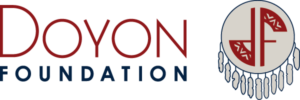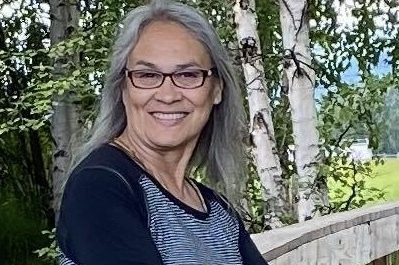“My language is my worldview”
An assistant professor at the University of Alaska Fairbanks (UAF), Polly Hyslop is of Dineh (Athabascan)-Scottish heritage from Northway and her language is Née’aaneegń (Upper Tanana). Polly is the daughter of Polly (Demit) Hyslop of Northway and Floyd Hyslop of Roscommon, Michigan. Her maternal grandparents are Bertha (Johnny) Demit-Sinyon of Yukon, Canada (Upper Tanana River region), and Elijah Demit of Ketchumstock in the Upper Tanana region. Polly’s paternal grandparents are Elizabeth Hyslop and Thomas Hyslop. Her son, Benjamin Schwartz, lives in Reno, Nevada.
Polly is a graduate of UAF and holds a bachelor’s degree in journalism, a master’s degree in justice and a doctorate in Indigenous studies. A past recipient of Doyon Foundation scholarships, Polly is a faculty member at the Center for Cross Cultural Studies at UAF.
Polly Hyslop is among Doyon Online Language volunteers helping to develop lessons for free, self-paced instruction in Upper Tanana language. A noted scholar whose interests include the teaching of Indigenous peacemaking practices, Polly researched restorative justice in rural Alaska for publication in 2016 in the Alaska Journal of Dispute Resolution. She is co-author of a book chapter on Tlingit Elder Harold Gatensby and his contributions to the practice of the Peacemaking Circle in Kake.
The Née’aaneegń language is fundamental to her understanding of how ancestors thought and viewed the world and the universe.
“I create space daily to practice speaking my language. My language is my worldview,” she said. Instrumental to her language learning are Polly’s grandmother, Bertha (Johnny) Demit-Sinyon, and Paul Milanowski, Avis Sam, Sherry Barnes and Laura Sanford.
Polly hosts Zoom meetings with Upper Tanana language learners and teachers, and works with other language-keepers to plan summer language camps at Northway. She is involved with Head Start on a language nest, the immersion method for language revitalization in early childhood education. She has developed language literacy classes for teachers and students, and hopes to contribute to the Upper Tanana Northway dictionary. Plans also call for work on digital libraries to document the knowledge and language of local Alaska Native people.
“The greatest challenge is to find Upper Tanana speakers to talk to,” Polly said. “Next greatest is making time to learn the language.
“Other language groups have been revived,” she said, noting success in Hawaii where Indigenous languages are heard in stores and schools. “We will need to work hard to bring our language back into everyday conversation.”
About Doyon Languages Online
Through the Doyon Language Online project, Doyon Foundation is developing introductory online lessons for Holikachuk, Denaakk’e (Koyukon), Benhti Kenaga’ (Lower Tanana), Hän, Dinjii Zhuh K’yaa (Gwich’in), Deg Xinag, Dinak’i (Upper Kuskokwim), Nee’anděg’ (Tanacross) and Née’aaneegn’ (Upper Tanana). The project officially launched in summer 2019 with the first four courses, now available for free to all interested learners.
Doyon Languages Online is funded by a three-year grant from the Administration for Native Americans (ANA), awarded in 2016, and an additional three-year grant from the Alaska Native Education Program (ANEP), awarded in 2017.
As Doyon Foundation continues to grow our language revitalization efforts in the Doyon region, we believe it is important to recognize people who are committed to learning and perpetuating their ancestral language. We are pleased to share some of these “language champion” profiles with you.
If you know a language champion, please nominate him or her by contacting our language program director at foundation@doyon.com. Language champions may also complete our profile questionnaire here. You may learn more about our language revitalization program on our website, or sign up to access the free Doyon Languages Online courses here.

